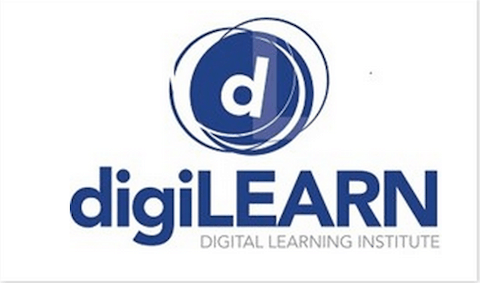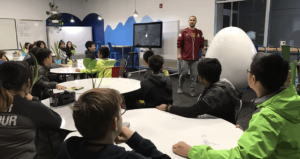Nonprofit DigiLEARN Seeks Innovation & Acceleration

The Digital Learning Institute, DigiLEARN, officially launched this week to accelerate digital learning and education innovation. The non-profit organization was founded and will be chaired by former North Carolina Gov. Bev Perdue, with former Wyoming Gov. Jim Geringer serving as vice chair. I’m pleased to serve as a board member. A great learning conference preceded the first board meeting.
Weapons of mass instruction. Michael Moe, GSV, kicked off the digiLEARN meeting by illustrating that change can happen–it has happened in every major sector and is beginning to transform how human beings learn.
Education is $4.5 trillion global sector but one that, until recently, received almost no early stage investment. While starting from a similar base twenty years ago, health care has benefited from far more investment, innovation, and value creation. But things are changing–and fast–venture investing is growing by 43% annually. Moe pointed to the learning app explosion and parent/student as consumer as driving trends. He noted the viral growth of Edmodo, Clever, Coursera and CodeAcademy as examples.
Moe outlined a few learning trends:
- Kaizen EDU: continuous education and lifelong learning;
- Return on education: focus on a positive impact for students;
- Knowledge as a currency: skills as entry point for idea economy;
- Harvard meets Hollywood, education becoming engaging;
- Education knowledge stacks: major vendors offering hardware/software bundles;
- Just for me: customized learning; and
- Bundling: closed system of degrees will come to an end replaced by a system more like an iTunes bundle–a personalized knowledge portfolio.
On the Hunt. You can’t have an education conversation in North Carolina without Jim Hunt, four time governor. He said, “America and North Carolina must do better at educating our people–don’t ever stop thinking about it, don’t stop being mad about it.” Hunt noted the improvement in the North Carolina graduation rate to 83%–but not a level anyone should be satisfied with particularly because many graduates that go on to college require remedial education.
Hunt is the most important and longest serving advocate of national standards. “Common Core are high and rigorous standards that will help us compete with the rest of the world,” said the former governor. He reminded the audience, “They are State Standards–developed by the states.”
Referencing the 50th anniversary of the war on poverty, Hunt said we won’t win the war on poverty unless we embrace higher standards and take advantage of great potential of technology to help students learn, to measure learning, and to report on learning.
Great learning. Gov. Perdue asked a group of experts “What does great learning look like in a global economy.”
Mark Edwards, Mooresville Graded School District, said “We need to prepare students for their future, not our past.” He said students should know what they are doing, why they are doing it, and how they’ll use it. Edwards said active engagement can sound like a chaotic classroom. “Relevance changes student’s view of the work they are doing,” said Edward. (Watch for an interesting announcement in a couple weeks about a project-based learning initiative in Mooresville). Several speakers referenced Mooresville during the day, noting that good goals and collaborative leadership are often more important than technology to transforming a system.
Tim Brady, ImagineK12, described how the cost to start a company has come down by an order of magnitude with better application development platforms and lean startup methodology. Brady said that these days “Teachers have a hand in shaping technology– startups would love to talk to you and get your feedback.” Brady urged active participation in developing EdTech tools.
Like More, I said the viral adoption of learning apps by teachers, parents and students is most visible trend in learning, but leveraging these apps to create learning systems is the most important trend. This systems design work includes:
- Engaging and competency-based learning sequences for students;
- Leveraging great teaching with technology; extending the reach of the best teachers, and improving conditions and careers; and
- Coherent school models and integrated IT stacks (see Summit Denali and Michigan’s EAA).
The digiLEARN board will be building a high impact agenda based on the input from this conference.







Michael Flood
Tom -- Lots of amazing resources for digital learning and more appearing everyday. Empowering students, extending teachers, improving schools and increasing opportunity. No doubt. But let's not forget a significant portion of our students still lack access to anything digital outside school due to a lack of network access! In line with the conversation above, Kajeet is a fast growing and lean tech startup bringing the huge telecom industry capabilities to address education broadband access equity for students off-campus in a dramatically more efficient and secure model. We are passionate that students must be able to connect anytime / anywhere to truly leverage everything else that is being built!!!